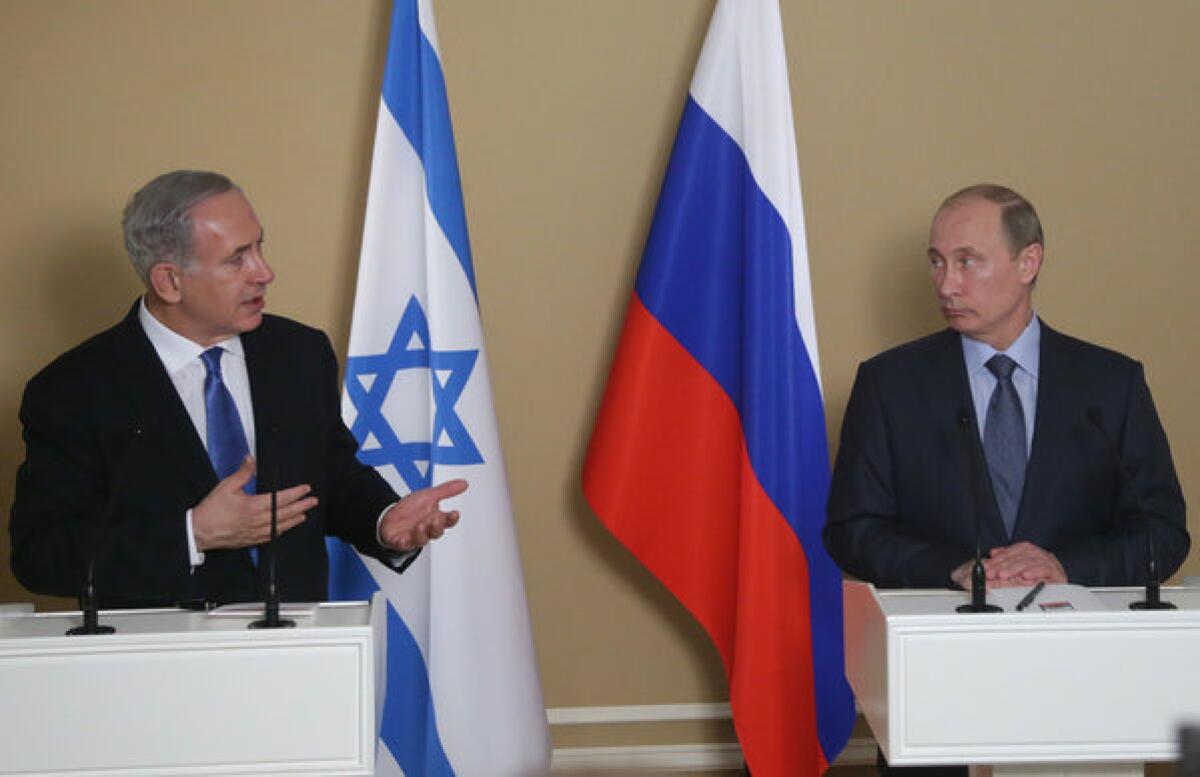U.S.-Russia ‘reset’ thwarted by Syrian war, spy scandal

- Share via
Just when it seemed that Russia was poised to collaborate with Western powers on a new peace mission for Syria, a spy scandal has erupted to revive Cold War-era mistrust and division.
Russian Foreign Minister Sergei Lavrov and U.S. Secretary of State John Kerry had agreed barely a week ago to use their respective influence with Syrian President Bashar Assad and the rebels fighting him to convene face-to-face negotiations.
On Monday, British Prime Minister David Cameron told President Obama that he found “common ground” with the Kremlin on the Syria crisis during his Moscow visit late last week. And Israeli Prime Minister Benjamin Netanyahu, in Moscow on Tuesday, urged President Vladimir Putin to hold off on delivery to Assad of sophisticated missiles that could encourage him to spurn the peace talks and fight on.
The converging interests on Syria provided some reprieve from a spiraling decline in U.S.-Russian relations in recent months and rekindled hope of a long-sought “reset” in the post-Soviet era.
But Tuesday’s news that a U.S. Embassy officer had been expelled for alleged spy recruitment may undermine the new-found collaboration. Ryan Fogle, a third secretary at the embassy whom the Russian government accused of being an undercover CIA agent, was reportedly intercepted by Russian federal authorities carrying a knapsack filled with disguises, money and a letter offering turncoats as much as $1 million a year for providing intelligence.
In a statement on the Russian Foreign Ministry website, the government declared Fogle “persona non grata” and ordered him out of the country. “Such provocative acts in the spirit of the Cold War hardly facilitate the strengthening of mutual trust,” the government said.
Images of Russian agents pinning Fogle to the ground, of his interrogation during overnight detention and of the spycraft props he was reportedly carrying -- wigs, flashlight, map and compass -- were disseminated by state-influenced media in the hours after Fogle was caught meeting with a Caucasus counter-terrorism agent. The Caucasus region includes Chechnya and Dagestan, the restive southern provinces racked by Islamic insurgencies and home territory of the Boston Marathon bombing suspects.
Some Kremlin-watchers see a crisis of convenience in the high-profile counterespionage operation. If Putin is wavering in his commitment to work together with the West on Syria, it affords cover for retreating from a move that might be construed as a foreign-policy concession to old nemesis Washington.
“One can handle these espionage matters quietly or noisily. The Russians have made a choice in handling this one noisily. That may be because Syria is a harder problem. The spy scandal may not be the cause of Russia reconsidering what to do in Syria, but it provides an opportunity for them to be more difficult,” said Jeffrey Lewis, a defense and security expert at the Monterey Institute of International Studies.
“The advantage of making a big deal out of this spy story is that it plays into this nationalist narrative of how the West continues to take advantage of Russia,” Lewis said.
Assad, whose authoritarian regime has long been a close Russian ally and arms importer, may have been pushing Putin to follow through on the delivery of S-300 missiles ordered and paid for three years ago, Lewis speculated. Israel carried out airstrikes early this month against Hezbollah-bound weapons convoys moving through Syria. Also, the United States and its NATO allies have been pondering the imposition of a “no-fly” zone to help the rebels by grounding Assad’s air power.
Putin and Netanyahu held a brief news conference after their Kremlin meeting but made no mention of the missiles. Russian media said before the two met that Putin planned to inform Netanyahu that the delivery would be made soon.
Russian officials may be stepping back from cooperation with Western powers on Syria to rethink their options, said Kori Schake, a research fellow at Stanford’s Hoover Institution and a former National Security Council defense strategy official.
She believes Moscow may still be brought on board in the new Syria peace effort, if officials can be persuaded that part of their problem with Islamic rebellions in the Caucasus is the alliance with Assad. The Syrian president’s Shiite-affiliated Alawite government is accused of atrocities against Syria’s Sunni majority.
“One thing they could do if they are actually worried about rising Islamism in Russia is to stop assisting a government that has killed 85,000 Muslims,” Schake said, referring to the latest estimate of civil war dead from the Britain-based Syrian Observatory for Human Rights. “If the Russians really care about tamping down Islamism, getting on the side of the opposition in Syria might do something for them.”
The Obama administration has also spoken of making further nuclear arms reductions, including in substrategic Europe-based missiles, that would benefit Moscow far more than the United States, Schake said.
But what is in Moscow’s best long-term interests may be obscured by the wish to avoid an impression that Putin is retuning Russia’s Syria policy at the behest of a still-adversarial U.S. government.
“Russia is looking for an excuse to deliver the missiles and to avoid negotiations that Assad doesn’t want,” Schake said. “Putin doesn’t want to look like he’s giving in to the United States on a major foreign policy issue with Syria, so he will turn up the heat by doing something as anti-American as arresting a diplomat.”
ALSO:
Russia says American was recruiting for CIA
Human Rights Watch alleges rebel atrocities in Syria
Israeli attacks in Syria aimed at Hezbollah, not as aid to rebels
A foreign correspondent for 25 years, Carol J. Williams traveled to and reported from more than 80 countries in Europe, Asia, the Middle East and Latin America.
More to Read
Sign up for Essential California
The most important California stories and recommendations in your inbox every morning.
You may occasionally receive promotional content from the Los Angeles Times.











